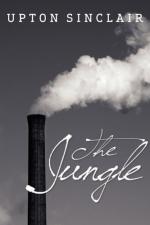|
|
The Jungle Author/Context
Upton Beall Sinclair was born on September 20th, 1878 in Baltimore, Maryland. His parents were part of a ruined Southern aristocracy, devastated and impoverished by the Civil War. His father was an alcoholic liquor salesman who moved the family to New York when Sinclair was ten years old. Sinclair was a bright child who began writing short novels in his teens. At age 14, he enrolled in the City College of New York where he continued writing dime novels and pulp fiction which enabled him to support himself during college. After earning a degree in 1897, Sinclair enrolled at Columbia University for graduate studies. Three years later, he married his first wife, Meta, with whom he had a son. Around this time, Sinclair was exposed to Socialism and counted it a life-changing discovery as well as an impetus to action. The Socialist weekly, Appeal to Reason, sent Sinclair to the Chicago stockyards on assignment for a journalistic expose. Sinclair worked in the meatpacking plants in the yards, witnessing illegal practices and unsafe food handling which he was to later detail in The Jungle. During his time in the yards, Sinclair wrote a number of articles for various magazines, including "Is Chicago Meat Clean?" for Colliers Weekly, in April of 1905. At this time, a number of investigative journalists, called "muckrakers" by President Roosevelt, were writing exposes of various industries, including Ida Tarbell, Lincoln Steffens and Thomas Lawson. Their writings greatly influenced Sinclair's own writing.
Sinclair wrote The Jungle using details he gathered during his investigation-including the startling exploitation of laborers in the packing plants, the squalor of the yards neighborhoods and the corruption of the Beef Trust. Sinclair's novel was rejected by six publishers and when he announced his intention to publish the book himself in an announcement in Appeal to Reason, he received nearly a thousand orders. Doubleday decided to publish The Jungle, but not before Sinclair published a number of copies himself.
When The Jungle was published, the nation reacted in horror. After reading the novel, President Theodore Roosevelt ordered an immediate investigation into the meat industry, though privately he told Sinclair that he disliked the Socialist polemic near the end of the novel. Within months, two pieces of legislation resulted from Sinclair's novel: The Pure Food and Drug Act and the Meat Inspection Act, both signed into law on June 30th, 1906. Sinclair was an instant celebrity and a Socialist hero, and was finally financially stable. He lamented the fact that the nation focused only on the unsafe food handling aspect of his novel, and ignored the problem of labor exploitation. He famously quipped: "I aimed at the public's heart and by accident I hit it in the stomach."
After the success of The Jungle, Sinclair became even more involved with the Socialist movement, running for various offices in state and national elections when he moved to California with his second wife, Mary. He was always beaten and often by a landslide. In 1917, Sinclair resigned from the Socialist Party following a split in ideology. He founded the American Civil Liberties Union in California and continued writing, producing a prodigious amount of novels including, The Profits of Religion in 1918, The Brass Check in 1919 and Oil! in 1927, as well as a number of others. But nothing would equal the success he enjoyed with The Jungle. In 1940, Sinclair began writing a series of novels, called the Lanny Budd Series. One of those novels, Dragon's Teeth, won the Pulitzer Prize for fiction in 1943. After his wife died in 1961, Sinclair remarried.
Sinclair died on November 25, 1968 at age 90. He is best remembered for The Jungle, the most enduring of the muckraker exposes.
Bibliography
Bloodworth, William. Upton Sinclair. Boston: Twayne Publishers. 1977.
Harris, Leon. Upton Sinclair: American Rebel. New York: Thomas Y. Crowell, Co. 1975 1991.
Scott, Ivan. Upton Sinclair, the Forgotten Socialist. Lewiston, New York: Edwin Mellen Press, 1997.
Sinclair, Upton. The Autobiography of Upton Sinclair. New York: Harcourt, Brace & World, Inc. 1962.
Sinclair, Upton. The Jungle. New York: Grosset & Dunlap. 1906.




